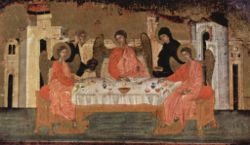Hospitality
Hospitality refers to the relationship process between a guest and a host, and it also refers to the act or practice of being hospitable, that is, the reception and entertainment of guests, visitors, or strangers, with liberality and goodwill. Hospitality frequently refers to the hospitality industry jobs for hotels, restaurants, casinos, catering, resorts, clubs and any other service position that deals with tourists.
Hospitality is also known as the act of generously providing care and kindness to whomever is in need.
Hospitality
For an in depth understanding of the term of hospitality, the starting point is the etymology of the word itself. The word hospitality derives from the Latin hospes, which is formed from hostis, which originally meant a 'stranger' and came to take on the meaning of the enemy or 'hostile stranger' (hostilis) + pets (polis, poles, potentia) to have power. Furthermore, the word hostire means equilize/compensate.
If you combined the above etymological analysis with the story of Telemachus and Nestor you can develop in your mind the Xenia (Greek)|Greek concept of sacred hospitality.
First of all, Telemachus is a complete stranger for Nestor, however he was hosted and treated more than warmly. In the Homeric ages, hospitality was under the protection of Zeus. The God of the Gods. For that reason Zeus was also attributed with the title 'Xenios Zeus' ('xenos' means stranger). The semantic behind this was to highlight the fact that hospitality for Ancient Greeks was of the utmost importance. A stranger passing outside a Greek house, could be invited inside the house by the family. The host washed the strangers feet, offered him/her food and wine and only after he/she was feeling at comfortably could be asked to tell his/her name.
After having welcomed Telemachus, Nestor asks his unknown guest to introduce himself to find out that he was the son of Odysseus. By that time, the man in front of him was a complete stranger, a hostis as described in the etymological analysis of hospitality at the beginning. Nonetheless, Telemachus was equilized with his host. Another meaning that is included in the etymology of hospitality. Note also that one of the Nestor's sons slept on a bed close by Telemachus to take care that he should not suffer any harm. This means that hospitality for Ancient Greeks include also the idea of protection. Lastly, Nestor put a chariot and horses at Telemachus' disposal so that he could travel the land route from Pylos to Sparta in two days, having as charioteer Nestor's son Pisistratus. The last element of hospitality as can be realized is guidance.
Based on the story above and its current meaning, hospitality is about compensating/equalizing a stranger to the host, making him feel protected and taken care of, and at the end of his hosting, guiding him to his next destination.
Contemporary usage
Contemporary usage seems different from historical uses that lend it personal connotations. Today's hospitality conjures images of throwing good parties, gracious hosts entertaining, etiquette, Martha Stewart or even talk shows, or, the hospitality services industry as it relates to the entertainment and tourism business. On the other hand, hospitality used to be, and still is, a serious duty, responsibility, or ethic. Hospitality ethics is a discipline that studies this usage of hospitality.
In the western context, with its dynamic tension between Athens and Jerusalem, two phases can be distinguished with a very progressive transition: a hospitality based on an individually felt sense of duty, and one based on "official" institutions for organized but anonymous social services: special places for particular types of "strangers" such as the poor, orphan(s), ill, alien, criminal, etc. Perhaps this progressive institutionalization can be aligned to the transition between Middle Ages and Renaissance (Ivan Illich, The Rivers North of the Future).
Biblical and Middle Eastern
In Middle Eastern Culture, it was considered a cultural norm to take care of the strangers and foreigners living among you. These norms are reflected in many Biblical commands and examples.[1]
Perhaps the most extreme example is provided in Genesis. Lot provides hospitality to a group of angels (who he thinks are only men); when a mob tries to rape them, Lot goes so far as to offer his own daughters as a substitute, saying "Don't do anything to these men, for they have come under the protection of my roof." (Genesis 19:8, NIV).
The obligations of both guests are stern. The bond is formed by eating salt under the roof, and is so strict that an Arab story tells of a thief who tasted something to see if it was sugar, and on realizing it was salt, put back all that he had taken and left.
Further reading
Of Hospitality - Jacques Derrida, translated by Rachel Bowlby (Stanford: Stanford University Press, 2000).
